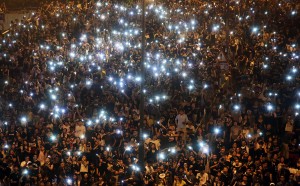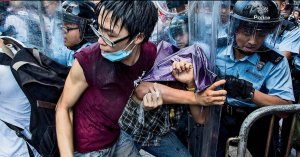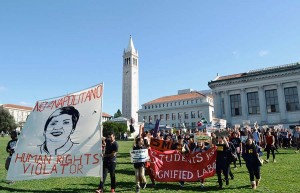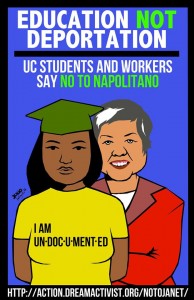Yojana Sharma, University World News, September 30, 2014– Hong Kong university students – part of a huge, often spontaneous pro-democracy movement that has occupied the streets of central Hong Kong in recent days – said on Monday that they would extend their week-long boycott of classes to an indefinite one.
“We urge students to boycott classes indefinitely and teachers to boycott teaching,” said the statement by Hong Kong University Students’ Union and Scholarism and other groups.
The week-long university strike that started on 22 September with rallies around the campus of the Chinese University of Hong Kong, or CUHK, before spreading to central Hong Kong was to have ended on Friday 26 September with school-age students led by the campaign group Scholarism joining the strike for its final day.
Instead, huge crowds surged onto the streets at the weekend and into Monday, blocking major roads. The students and public were angry about police tactics and dozens of arrests made outside Hong Kong government headquarters, where students broke through the police cordon to occupy the area late on Friday night.
The one-week class boycott has been extended because of “violence by the police force”, said the Hong Kong Federation of Students, or HKFS, which has 60,000 members and is one of the student boycott’s largest organisers.
The boycott had been called after China last month insisted that candidates for a promised Hong Kong leadership election in 2017 would be pre-selected by representatives of China, angering pro-democracy groups. Young people are demanding genuine democracy.
HKFS and Scholarism warned that civil disobedience would spread unless Hong Kong Chief Executive CY Leung responds to protesters’ demands by 1 October. Possible action includes a general strike, and more class boycotts, they said.
Occupy Central co-founder Chan Kin-man said that if Leung announced his resignation, the occupation of the key areas in Hong Kong would stop for a short period of time before they decide on their next move.
But Leung said in a press conference on Tuesday that he would not give in to demands for his resignation. Any such action before ‘universal suffrage’ was implemented would mean Hong Kong picking a new leader under the existing system.
Arrests
The protests escalated after pro-democracy legislators, professors and student leaders were arrested during the police action at the government offices on Saturday morning, among them Alex Chow and Lester Shum, leaders of HKFS, three Hong Kong legislators and the convener of the Alliance for True Democracy, Joseph Cheng, a political science professor at Hong Kong’s City University.
Thousands poured onto Hong Kong’s main arteries demanding their release – in particular the release of Joshua Wong, 17, leader of Scholarism, a group of high-school students. Yvonne Leung, president of the Hong Kong University’s student union told media that Wong had been dragged away by police on Saturday morning.
Michael Davis, a professor of law at Hong Kong University, or HKU, said: “The legitimacy of the Hong Kong government is at stake and they certainly undermined their position by [tear] gassing students on the streets.
“That kind of aggressive behaviour, I think, stimulated almost half the protesters to come out,” he told local radio, describing it as a critical moment for the Hong Kong government. “They really need to be trying to do something to represent Hong Kong concerns and not just Beijing concerns.”
While Wong was held for 40 hours – the maximum allowed under Hong Kong law without charges being laid – the crowds on the streets mushroomed to over 80,000, according to HKFS estimates, with police unsuccessfully attempting to disperse them with pepper spray and teargas.
“I don’t think they [Beijing] will listen to our demands, but I am angry that the Hong Kong police treat us in this way, that is why I am here,” said a HKU law student who gave her name only as Grace. She said she had not taken part in the initial student boycotts though she had joined pro-democracy rallies through the streets of Hong Kong in early July.
While police refused to answer many questions at a press conference, they said teargas was used 87 times at nine different locations on Saturday and Sunday.
While many protesters had come prepared with goggles and face masks, most had only their umbrellas to protect them, leading to the protests being dubbed the ‘umbrella revolution’.
More than 70 people were arrested during clashes with police outside the government headquarters over the weekend, with CUHK offering legal advice to students who were arrested. HKU estimated that least 10 of its students were arrested and said it would provide legal advice and other support to the students.
In a statement, HKU’s Vice-chancellor Peter Mathieson said: “We will be flexible and reasonable in understanding the actions of students and staff who wish to express their strongly-held views.”
He added a plea for all parties to express their views peacefully and constructively. “We will also be flexible in understanding practical difficulties that staff and students may face in reaching the campus during periods of transport disruption,” the statement said.
Refusal to back down
Despite a major escalation in the protests, Chief Executive Leung – who had refused to meet with students to consider their demands – said at a press conference on Sunday that the Hong Kong government was “resolute in opposing the unlawful occupation of government buildings”. He reiterated that the Hong Kong government would uphold Beijing’s decision on elections.
A Hong Kong government statement on Sunday said the decision of the Standing Committee of the National People’s Congress, or China’s one-party parliament on Hong Kong’s elections, was “legally binding”.
Consultations on the Hong Kong election system had been scheduled to take place but the administration announced that these would now be held at a “better time” – a move that Occupy Central slammed as a delaying tactic. The administration was “just hoping people’s desire for genuine universal suffrage to fade over time”.
Leung issued a video-statement addressing Hong Kong citizens. He called on people to leave the protests, and dismissed rumours that police had opened fire or that the government was ready to call on China’s People’s Liberation Army to maintain order.
Commentary in the online edition of China’s communist party newspaper the People’s Daily blamed the unrest in Hong Kong on “extremists” backed by “foreign anti-China forces”. Pictures and reports of the Hong Kong unrest has been censored in China.
Read More: University World News


 Follow
Follow


